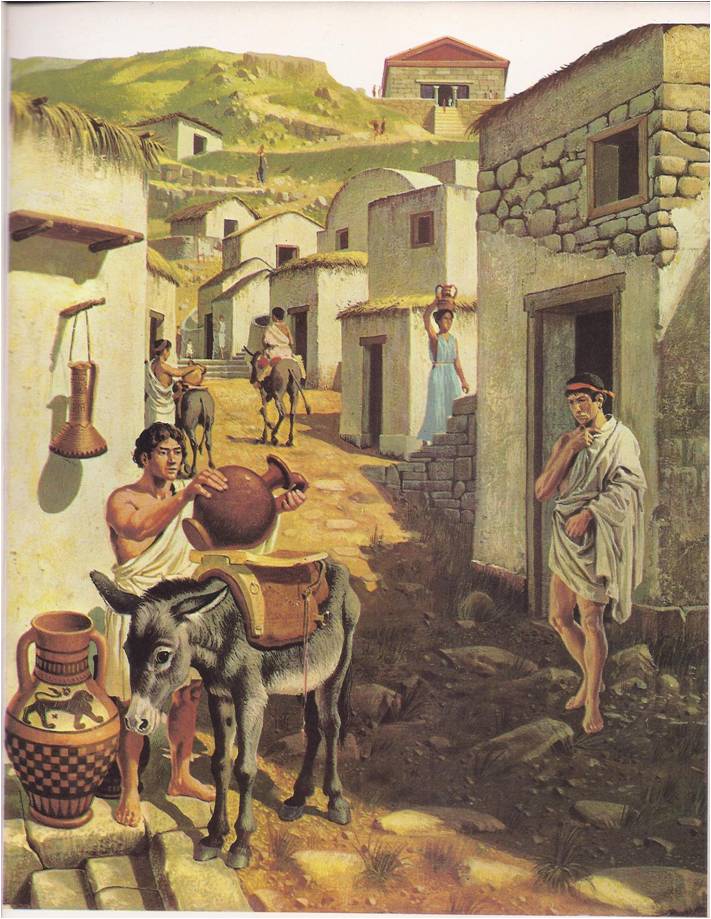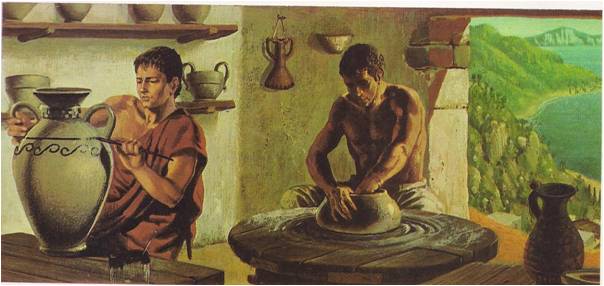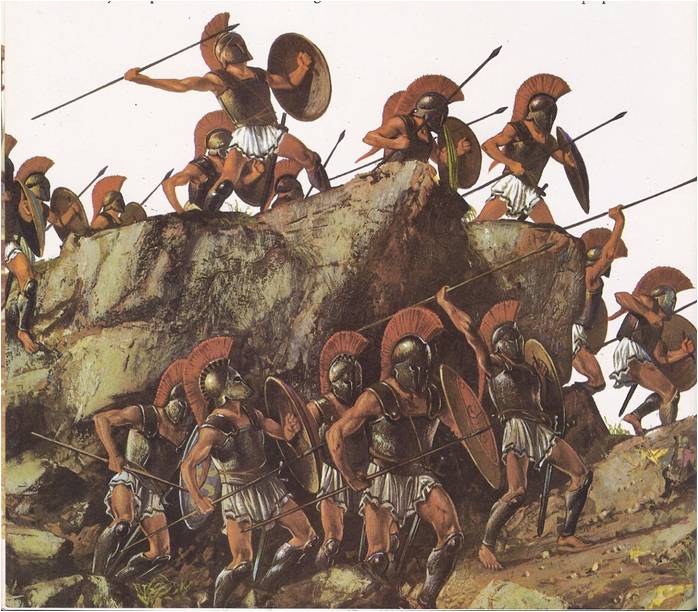During the Dark Ages, the large kingdoms of Homer’s Achaean heroes had disappeared. The Greek world was now dotted with dozens of little countries. They had begun with fortresses set on hills and crags. Soon each fortress was surrounded by a village, as farmers abandoned their huts in the fields and built new homes close to the walls. In times of danger, they could take refuge behind the walls. A market place was built and a few metalsmiths and potters opened shops. When temples were set up inside the fortress, the castle hill became an acropolis, a “high town,” the sacred centre of a kingdom as well as a place to hide from attackers. The village chief began to call himself a king.
The New Noblemen
In a kingdom not much bigger than a town, everyone could keep an eye on the king and his friends, the noblemen. The people watched their rulers carefully, for life in Greece was changing and not always for the better. Food was scarce and there was meat only on holidays. The rest of the year, the people ate mostly barley porridge and sometimes fruit and olives. Even wheat was expensive and no one had any money. The little kingdoms did not have enough olive trees to make them rich. Besides, the groves belonged to the noblemen, who never shared their profits.
These new noblemen were not knights. They managed the kingdom’s business, like a town council and they kept a tight hold on their land but when it came to war, they were perfectly willing to give everyone a share in the fighting. Noblemen no longer rode to battle in chariots and fought in single combat. Battles were now fought by long lines of men who formed a deadly wall of swords and shields. All armies used the new formation and to be effective it required every man in the kingdom.
That meant more problems to the king. The citizen-soldiers began to ask why, if they were so important in battle, they should not be just as important at home. They made angry speeches at the Citizen’s Assembly to which all the men of the kingdom belonged. The Assembly had always had the right to vote on peace or war, but the citizens began to demand the right to vote on other things. They wanted land, new laws, more food and lower taxes. The king promised to see what he could do, hoping that this would be enough to satisfy them.
Revolt in the Towns
The people were not so easily satisfied. Living in a town, they talked with their neighbours and the townsmen they met at the market. Soon they realized that together they were stronger than their ruler. They were ready for revolution and all they needed was a leader.
In the little Greek Kingdoms, there were many kings who wondered nervously what their people were saying when they met on the streets. Some Greek rulers grew frightened and changed the laws to please the citizens. They were the ones who kept their thrones. Others waited until it was too late. Their own noblemen turned against them, drove them from their places and set up councils to run the states. The councils of nobles, called oligarchies, were interested in saving their own land and gold. In many states, they too, were driven out – by men who won the people’s trust.
Greek Tyrants
The new leaders ruled as tyrants. At first, the Greek word tyrannos, meant no more than a leader who ruled alone and wrote his own laws. He might be good or bad. So many were bad that in time, the meaning of the word changed and had no good in it. Meanwhile the citizens’ assemblies were growing stronger and the people talked of running the government themselves. No nation had ever been governed that way, but the citizens of some cities decided to try it. These experiments led to democracy.
By 500 B. C., three hundred years after the Dark Age had ended; the Greeks had tried nearly every form of government that men could imagine. There were democracies, kingdoms, oligarchies and cities ruled by tyrants. Each little country could choose its own type of government, because it was separate and independent. No one thought of joining them to form one nation.
Foreigners could not understand it. Travelling around Greece, a foreigner met people who dressed alike, spoke the same language, traded with one another and worshipped the same gods. In almost everyway, they were like people who belonged to the same country, but when he asked them about the Greek nation, they laughed and said that there was no such thing. Their own city was a nation, they said; so was the city ten miles down the coast and one beyond that.
It was a puzzle – to everyone but the Greeks. The key to the puzzle was the Greek word polis. A Greek would tell a foreigner that it meant “city” – at least, that was one of its meanings. A polis was a city and the fields outside its gates. It might include a mountain or two, a harbour and sometimes several little country towns. So the foreigner tried calling it a “city-state”, because it was more than a city, less than a country and something like both.
The word however, meant more than that. Polis was also the government of the place and polis meant the people, too – the people who were citizens, were loyal to each other and to their own polis. The first of them had been tribesmen, who found an unclaimed valley or hilltop and took it as their own. The mountains and the ocean shut it off from the rest of the world, which was an advantage in the Dark Age. There were no neighbours then. Any man who was not a member of the tribe was an enemy.
In three hundred years a great city spread across the plain from the old stronghold on the acropolis. There were dozens of ships in its harbour and its merchants sailed to every corner of the Mediterranean. The land outside the polis was still foreign and the men of the new cities were as loyal to their polis as the ancient warriors had been to their tribes. A citizen’s polis was his home and the home of his gods. He had a place in its government and it gave him his work, protection and amusements.
The Polis
The Greeks said that a man who was not a citizen of a polis was nothing. A man who lived in an empire ruled by a king he had never seen was less than nothing – he was a slave. A man whose polis was defeated or destroyed might as well be dead, but the citizen whose polis was strong and free had everything. When he worked to make the best of his city and himself, he rivalled the gods in greatness and that, the Greeks said, was the only reason for living.

The two most famous poleis (the plural of polis) reached greatness in different ways. Athens was a democracy, the home of politicians and artists of merchants, scholars and poets. The free men of the polis made it the richest and most beautiful city in Greece. Sparta, about 150 miles away by land, was a kingdom and soldiering was its only interest. Its people lived on a military schedule; they almost thought together in platoons. Their polis was poor and plain, but without question it was the strongest city in the Greek world.





